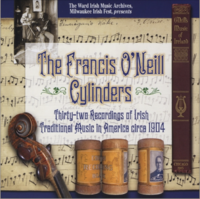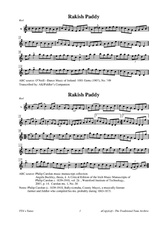Template:Pagina principale/Vetrina: Difference between revisions
No edit summary |
No edit summary |
||
| (112 intermediate revisions by the same user not shown) | |||
| Line 1: | Line 1: | ||
{{SheetMusic | {{SheetMusic | ||
|f_track= | |f_track=Rakish Paddy Reel.mp3 | ||
|f_pdf= | |f_pdf=Rakish Paddy.png | ||
|f_artwork= | |f_artwork=Rakish paddy.pdf | ||
|f_tune_name= | |f_tune_name=Rakish Paddy | ||
|f_track_title= | |f_track_title=Rakish Paddy | ||
|f_section= | |f_section=X5 | ||
|f_played_by=[https://soundcloud.com/ | |f_played_by=Francis O'Neill - [https://soundcloud.com/ward-irish-music-archives Ward Irish Music Archive] | ||
|f_notes= | |f_notes=The Francis O'Neill Cylinders - Thirty-two Recordings of Irish Traditional Music in America, circa 1904. | ||
|f_caption= | |f_caption= Irish-American uilleann piper Patsy Touhey was recorded on a cylinder machine by Capt. Francis O'Neill in Chicago playing the tune in 1904. It may be that O'Neill obtained the setting of the tune that appears in his Dance Music of Ireland (1907) from the piper. | ||
|f_source=[https://soundcloud.com/ | |f_source=[https://soundcloud.com/ward-irish-music-archives/rakish-paddy-reel Soundcloud] | ||
|f_pix=420 | |f_pix=420 | ||
|f_picpix=200 | |f_picpix=200 | ||
|f_article=[[ | |f_article=[[Rakish Paddy | '''Rakish Paddy''']] | ||
Brendan Breathnach (1963, 1971), Robin Williamson (1976) and other knowledgeable musicians generally think the tune, a perennial favorite of performers, originated in Scotland. O'Neill finds that Bremner published it under the title "Caper Fey" (an English corruption of the Gaelic "Caber Féigh/[[Cabar Féidh]]," 'the deer's horns') in 1768 in his '''Second Collection of Scots Reels or Country Dances.''' "Rakish Paddy" is cited by Cowdery (1990) as the title tune of a dance tune family (including one march version) which includes the alternate titles given above. | |||
There are three distinct versions of the tune, says Cowdery, the first and most common of the three has its two strains corresponding to the Scots "Caber Féigh/[[Cabar Féidh]]." The second was recorded by fiddler John Doherty and appears to be particular to his home County Donegal (see [[O'Halloran's]]), and the third (recorded by County Clare fiddler Bobby Casey and played by many) is a four-strain variation of Caber Féigh/[[Cabar Féidh]], though the last two strains appear to be variations of the second. Caoimhin Mac Aoidh also states that the County Donegal version is different than the "Rakish Paddy" played in the south of Ireland. | |||
In fact, he traces an unusual version of "Rakish Paddy" from Charlie Doherty, a member of the famous fiddling Doherty family of Donegal, who brought the tune back to Ireland with him from his years in America. Although Charlie’s death from a fall out a second-story window was untimely, the tune was ultimately popularized by the playing of his younger brother John and now is known throughout Donegal. | |||
Flute player Roger Sherlock remembers "Rakish Paddy" was a favorite of uilleann piper Willie Clancy's (Miltown Malbay, County Clare) in the 1950's and 1960's when Clancy joined Sherlock and other Irish émigré musicians for a time in London. Breathnach (1963) states that O'Neill's identification of "[[Sporting Pat (1)]]" as a variant of "Rakish Paddy" is erroneous. See also the related Donegal reel [[O'Halloran's]], [[New Copperplate (The)]] as well as [[Coveny's Reel]]{{#info: | |||
<score lang="ABC"> | |||
X:1 | |||
T:Coveny’s Reel | |||
M:C| | |||
L:1/8 | |||
K:Amin | |||
d3c|:Ad{e}dc Addc|A/c/A GF ECCE|AD{e}dc Ad e/^fg|^fdEA ^FDDA| | |||
</score>|service}} | |||
. | |||
}} | }} | ||
Latest revision as of 18:51, 1 February 2025

Played by: Francis O'Neill - Ward Irish Music Archive
Source: Soundcloud
Image: The Francis O'Neill Cylinders - Thirty-two Recordings of Irish Traditional Music in America, circa 1904.

Brendan Breathnach (1963, 1971), Robin Williamson (1976) and other knowledgeable musicians generally think the tune, a perennial favorite of performers, originated in Scotland. O'Neill finds that Bremner published it under the title "Caper Fey" (an English corruption of the Gaelic "Caber Féigh/Cabar Féidh," 'the deer's horns') in 1768 in his Second Collection of Scots Reels or Country Dances. "Rakish Paddy" is cited by Cowdery (1990) as the title tune of a dance tune family (including one march version) which includes the alternate titles given above.
There are three distinct versions of the tune, says Cowdery, the first and most common of the three has its two strains corresponding to the Scots "Caber Féigh/Cabar Féidh." The second was recorded by fiddler John Doherty and appears to be particular to his home County Donegal (see O'Halloran's), and the third (recorded by County Clare fiddler Bobby Casey and played by many) is a four-strain variation of Caber Féigh/Cabar Féidh, though the last two strains appear to be variations of the second. Caoimhin Mac Aoidh also states that the County Donegal version is different than the "Rakish Paddy" played in the south of Ireland.
In fact, he traces an unusual version of "Rakish Paddy" from Charlie Doherty, a member of the famous fiddling Doherty family of Donegal, who brought the tune back to Ireland with him from his years in America. Although Charlie’s death from a fall out a second-story window was untimely, the tune was ultimately popularized by the playing of his younger brother John and now is known throughout Donegal.
Flute player Roger Sherlock remembers "Rakish Paddy" was a favorite of uilleann piper Willie Clancy's (Miltown Malbay, County Clare) in the 1950's and 1960's when Clancy joined Sherlock and other Irish émigré musicians for a time in London. Breathnach (1963) states that O'Neill's identification of "Sporting Pat (1)" as a variant of "Rakish Paddy" is erroneous. See also the related Donegal reel O'Halloran's, New Copperplate (The) as well as Coveny's Reel<div class="mw-ext-score noresize" data-midi="/w/images/lilypond/8/j/8jrlda2e9dkv391o4l978c0objr21c1/8jrlda2e.midi"><img src="/w/images/lilypond/8/j/8jrlda2e9dkv391o4l978c0objr21c1/8jrlda2e.png" width="697" height="95" alt="
X:1
T:Coveny’s Reel
M:C|
L:1/8
K:Amin
d3c|:Ad{e}dc Addc|A/c/A GF ECCE|AD{e}dc Ad e/^fg|^fdEA ^FDDA|
"></div>
.
...more at: Rakish Paddy - full Score(s) and Annotations
X: 5 T:Rakish Paddy R:reel H:The tune comes from the Scottish tune "Cabar Feidh" (The Deer's Antlers). H:It is related to "The Copperplate", #308. H:This is the standard version with variations. H:See also #54 (4-part version), #647 (Donegal version) Z:id:hn-reel-53 M:C| K:Dmix V:1 clef=treble name="5." [V:1] c3B c2AB|cBAG EG~G2|Add^c de=fe|dcAG FGAB| c3B c2AB|cBAG EFGE|DEFG ABcA|1 dcAG FGAB:|2 dcAG FDD2|| |:eg~g2 ag~g2|eg~g2 edBd|ea~a2 bgag|eaag edBd| eg~g2 ag~g2|egge defg|afge fde^c|1 dcAG FDD2:|2 dcAG FGAB|| P:"Variations:" cAAB cAAB|cAAG EG~G2|Add^c de^fe|dcAG FGAB| cAAB cAAB|cAAG EFGE|D2 (3EFG ABcA|dcAG FGAB| c2AB cded|cABG EG~G2|Add^c d2 (3g^fe|dcAG FGAB| c2AB cded|cABG EFGE|FD (3EFG ABcA|dcAG FDD2|| |:eg~g2 ag~g2|eg~g2 eA (3Bcd|eaag ~a3g|ea~a2 eA (3Bcd| efge afge|fde^c defg|afge fde^c|1 dcAG FDD2:|2 dcAG FGAB||
